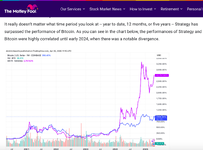Over the past five years, Strategy is now up 2,758%, compared to Bitcoin's 956%.
Completely valid and I don't dispute it. However:
-Direct Exposure & Purity: Investing directly in Bitcoin gives you pure, unadulterated exposure to the asset itself. MSTR stock price is heavily influenced by Bitcoin, but it's not a perfect 1:1 correlation. You avoid exposure to MicroStrategy's underlying software business performance.
-Operational Risk of MicroStrategy: MSTR is still an operating software company. Its stock price can be affected by factors unrelated to Bitcoin, such as the performance of its core business intelligence software, competition, management decisions, and general market sentiment towards tech stocks. Poor performance in the software division could drag the stock down even if Bitcoin's price rises.
-Management Risk: Investing in MSTR means you are also investing in the decisions and strategy of its management team, particularly Michael Saylor. Changes in leadership or strategy could impact the company's direction and stock value, independent of Bitcoin's price.
-Leverage Risk: MicroStrategy has often used debt to finance its Bitcoin purchases. This leverage magnifies both potential gains and potential losses. If Bitcoin's price drops significantly, the debt burden could become a major risk for MSTR, potentially more so than for an individual holding unleveraged Bitcoin.
-Premium/Discount Risk: MSTR often trades at a significant premium to the net asset value of its Bitcoin holdings. This means you might be paying more per "share" of Bitcoin through MSTR than buying Bitcoin directly. This premium can evaporate quickly based on market sentiment, causing MSTR to underperform Bitcoin. It could also sometimes trade at a discount, but the risk of the premium changing is always there.
-Complexity & Fees: Buying Bitcoin directly can be simpler and potentially have lower holding costs depending on the storage method.
-Dilution Risk: MicroStrategy may issue more stock in the future to raise capital (potentially to buy more Bitcoin or fund operations), which dilutes existing shareholders. Bitcoin itself has a fixed supply cap and isn't subject to this type of corporate dilution.
-Direct Ownership & Control: Holding Bitcoin directly gives you cryptographic ownership and control (if held in a self-custody wallet). Owning MSTR stock gives you ownership in a company that owns Bitcoin, which is a layer removed.
investing directly in Bitcoin is a focused bet on the asset itself, while investing in MicroStrategy is a leveraged bet on Bitcoin plus a bet on the company's operational success and management strategy. If your sole goal is Bitcoin exposure, the direct route is simpler and avoids company-specific risks.
 haha
haha




